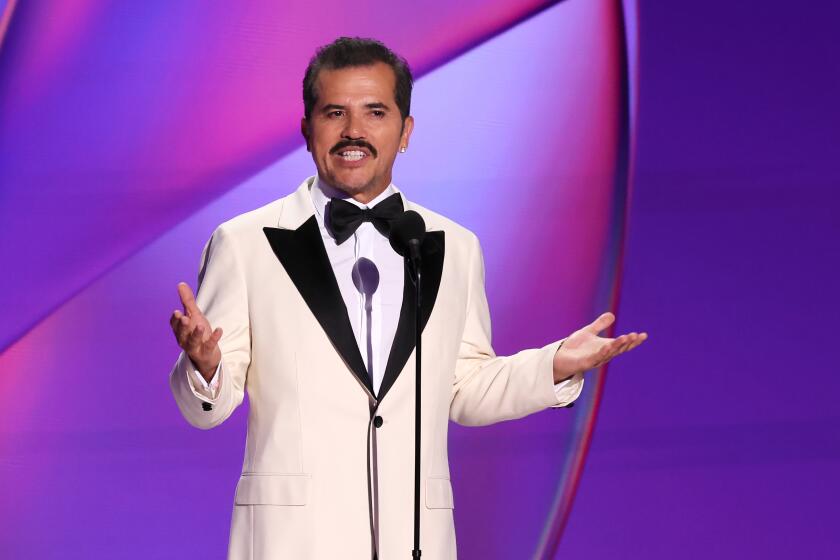NO SURPRISE GUESTS
DO you know who was robbed when the Emmy nominations were announced on July 19?
Ken Leung.
Wait, who?
Exactly. Leung was the actor who portrayed Carter Chong, Junior Soprano’s twitchy, violent associate in the asylum, on “The Sopranos.” (He’s the one who, classically, helped Uncle Junior write a get-out-of-jail-free plea to Vice President Dick Cheney that began: “Like yourself, I was involved in an unfortunate incident when a gun I was handling misfired
”)
Leung’s guest-starring turn, as a tightly coiled psych patient who turns on Junior when he feels the aging mobster is going soft, was carefully crafted and had a rewarding character arc in the course of just an hour. Beyond that, the already stereotype-nullifying portrayal -- a violent Asian man? -- was made nauseatingly relevant by association as the Virginia Tech shooting occurred the same week the episode aired.
It’s the kind of stuff the bestowers of awards usually eat right up, yet Leung was overlooked in the guest actor categories at the Emmys. So, as good as he seemed, was his performance just not up to par? Not necessarily. Rather than rewarding standout one-time appearances on episodic television, the category has become a mishmash of famous actor stunt casting and series regulars who were squeezed out of the supporting categories.
The rules behind the guest actor category have been very much in flux: Since the category was founded in 1993, there have been four major revisions to the regulations. “Prior to 1993, there were only two spots for performers to enter in, either lead or supporting,” said Sheri Ebner, manager of the Prime-Time Emmy Awards at the Academy of Television Arts & Sciences. So guest actors, including big-name stars, “had to compete against a regular cast member -- and it was a weird kind of feeling. They didn’t feel comfortable.”
When the category first appeared, it was specified that the eligible actor should have appeared in no more than three episodes of a series during a given season and must have received specific designation as a “guest star” in the credits.
Over the years, the rules morphed: The number of shows an actor could appear in was upped to six but needed to be part of a conclusive story line within the show, according to Ebner. The story line requirement was soon dropped.
Another rules change last year bumped out the requirement for any maximum number of episodes at all -- although each actor can submit only one for consideration. “The guest performer can come back from year to year, and reprise the role as the mother or the ex-wife,” Ebner said.
That’s exactly what happened this year, in the example of Kate Burton, nominated for her work in “Grey’s Anatomy.” Burton played Ellis Grey, mother to main character Meredith, for 15 episodes since the show began in 2005. By comparison, her colleague, Elizabeth Reaser, portrayed Jane Doe on the show for 11 episodes, all of which were in 2007. But what would seem like a regular character to viewers after a dozen episodes doesn’t matter -- both were billed as “guests” in the credits, a paper copy of which must be presented to the TV academy as proof for awards consideration -- and so they wind up in the same category.
None of this is to say that those nominated are unworthy. Jean Smart did a slam-bang job as First Lady Martha Logan on “24” -- over the course of 20 episodes in several seasons, she showed up her husband for the weasel he was in a big, layered subplot. She was nominated this year for guest actress in a drama series for the stunt reveal of her character in one episode last season. (Smart was nominated as supporting actress for the same role the previous year.)
“I didn’t see how Joel [Surnow, “24’s” creator] could possibly bring the Logans back -- they were out of the White House, they were divorced, it was two years later,” Smart said. “But they loved the characters and they knew the fans loved the characters. I told him I’d play Martha anytime, anywhere.”
Others met the more intuitive definition for a guest actor -- a one-shot, one-time deal -- but in roles that make you think twice about what the category really means. For instance, Ian McKellen was nominated for his stint on HBO’s comedy “Extras,” in which he played himself. It’s quite true that McKellen can do little to no wrong as an actor, but does he need to be honored for parodying himself?
In the episode, he emphasizes to star Ricky Gervais that he, you know, just imagined life as a sorcerer to play Gandalf in “The Lord of the Rings.” His specific method was to go through life as: “Sir Ian, Sir Ian, Sir Ian, Sir Ian ‘Wizard, you shall not pass!’ Sir Ian, Sir Ian, Sir Ian, Sir Ian.” It’s cute, but award-worthy? Wouldn’t the nomination have more resonance if it were given to, say, the unknown Nelsan Ellis, who was a standout as a shifty Ugandan child soldier on “Veronica Mars”?
Academy rules dictate that guest actors are determined by a combination of a popular vote and a select nomination panel, which, more often than not, still makes it a popularity contest. Ebner said a shortlist of 10 guest performances is created by a general vote of the membership -- and quite often these finalists do include some below-the-marquee actors. When push comes to shove, however, and the “blue-ribbon panel” selects the final five nominees, it’s almost always the big names who get the glory. “We were hoping to get some of the not-so-big movie stars in,” Ebner said, “but after all these years it happens very, very rarely.”
With all the machinations that go on in the nomination process, it seems inevitable that at some point some new faces will break the mold. Until then, Leung, Ellis and other actors trying to earn a little recognition will have to wait.
More to Read
The complete guide to home viewing
Get Screen Gab for everything about the TV shows and streaming movies everyone’s talking about.
You may occasionally receive promotional content from the Los Angeles Times.






